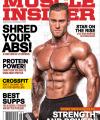Unlocking the Success Secrets of DLB
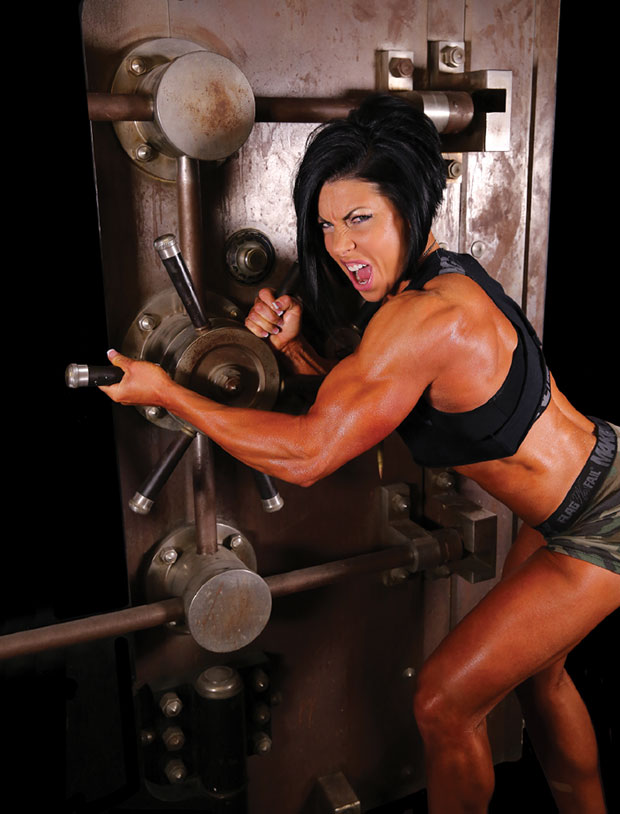
DLB Interview
There comes a time in every journalist’s life when she has to step up to the plate, to show the world who she is. This was my time. My chance. My opportunity to interview 2013 Ms. Olympia and 2015 Arnold Classic runner-up Dana Linn Bailey. The woman has been an absolute icon and pioneer in the physique division since the day she stepped on the pro stage. For me, this was a once-in-a-lifetime opportunity—a chance to pick the brain of the first-ever Women’s Physique Olympia, someone for whom training isn’t just a job, but also a passion. If you haven’t yet heard of DLB, then I regretfully inform you that you just might have been living under a rock since 2011, when Dana got her pro card at the Junior USAs. Since then, her meteoric rise to success has been documented through her collection of first-place trophies as well as the (minimum) two-hour lines that wrap around expo venues just to catch a glimpse of this star. This competitor, athlete, and entrepreneur has her finger in numerous diversified pies, and if you read the interview below, she shows no signs, and has no intention, of slowing down anytime soon. She was the first IFBB pro in the women’s physique category, and that was just the start of why she’s so awesome….
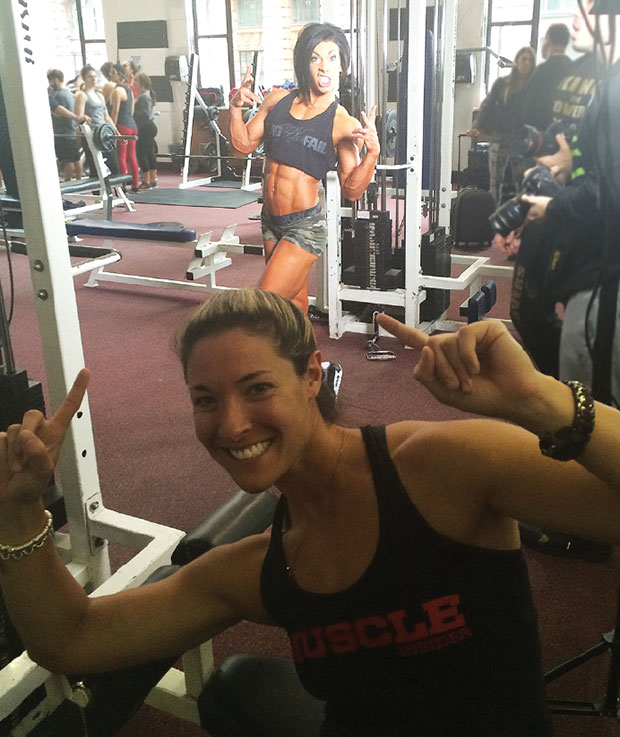
1) A lot of people know you got your start playing soccer, so you’ve always been an athlete. How did you transition into IFBB pro physique?
I just kind of started going to the gym. My whole background growing up was as a six-sport athlete. So every season I was involved with at least two sports, because I was on traveling teams and then school teams. I got recruited to play soccer for Westchester, so I played four years there, and after those four years, Rob and I kind of became more serious. He had a part-time job as a sous-chef at a restaurant. He had crazy hours as a college student; he’d go to school in the morning and then would have his prep shift, which he went in early for, then had a two-hour break from 2:00 to 4:00 before he had to go in again for night service. So from 2:00 to 4:00, he’d go to the gym. I would wait up for him until about 1 a.m. when he finished his shift, and that would be the only time I got to see him. He said, “Well, if you want to hang out, from 2:00 to 4:00, I go to the gym. So come with me!” I had a small background in lifting in that I knew exercises and I took strength and conditioning in high school, but never anything serious. I went with him and asked him what to do. We looked around, and you have the girls on the cardio machines, and the girls with the pink weights doing random exercises. I just basically followed him and did what he did. I started putting on muscle really fast, even without dieting. We were living on ramen noodles and McDonald’s, because I was in college at the time. We were only concerned with getting stronger.
At the gym, there were two girls that were getting ready for a show, and clearly just unhappy with their lives, and making sure everyone knew they were prepping for a figure show. I was missing that competitive side after I stopped playing sports, so I found out what the girls were doing, and said, “I look better than them and I just started lifting, so I’ll do the show too!” It was mostly just to add a little competitive side. I got some help from the owner of the gym. After my first show, I instantly became addicted.
2) What kind of physiques and personalities inspired you in the beginning, and what made you choose this path?
Well, at the time, I didn’t follow the sport at all. The first show I ever went to was my own. I had no clue what to do. I literally went in completely blind. I just did it. It was pretty cool. I got addicted to getting ready for something. I was going to the gym for a purpose. But I never followed the sport or went to a show before my own.
3) How do you feel the ideals and judging in the physique division have changed since its inception?
It changes from show to show, and changes based on what girls show up. Every show will be based on who shows up. If everyone shows up shredded or everyone comes in fuller, that will be the standard. It all depends on who’s judging, the quality of people that show up. So it’s never consistent. You have to go into it remembering that it’s an opinion-based sport. You’re judged on your body, so you have to remember that when you go in. That’s how I train. I used to train for the judges. In figure, they told me to soften up, not to lift so much, do more cardio, come in smaller, and I did the opposite because I didn’t want to look like that. I just did my own thing. My goal for Nationals in 2010 was to come in dead last. I wanted to look that good. I wanted abs and veins, and to be hard. I wanted to come in the total opposite of what they wanted. And that’s how I use the sport. There are people who train who don’t lift a certain way because they’ll do better at the show. That doesn’t sound fun to me. Why change the thing that I love the most, which is the gym? I just compete on the side. You can’t lose focus of the thing you love the most. People stop enjoying the process or their training, That’s why I look the same year round: because this is my lifestyle and it works for me. It’s people who do drastic things to get onstage that don’t enjoy it. You should enjoy everything about it.

4) Your weight doesn’t vary much between off-season and pre-contest. Are your meals significantly different in the two phases?
My meals are actually basically the same. The biggest difference for me right now is my life doesn’t revolve around the clock. I’m not eating every 2.5 hours; that’s when it changes the most, and that’s when I see the most changes in my body, when I’m living my life for bodybuilding. Now, I eat when I want, but it’s the same meals and generally the same portions. I try not to go too far from my plan. I may add a little extra protein, like 4 ounces pre-contest to 5 ounces off-season. Then, when I need to diet again, it’s not as hard. I also eat less frequently too in the off-season, like five meals versus seven pre-contest. Pre-contest, there’s no spontaneity to my life. Now, I’ll go out to eat when I have to. With traveling, I’m basically eating out for most of my meals anyway. I’m more off-season now than I’ve ever been, because of all the traveling I’m doing.
** How far in advance do you usually start to clean it up?
I like to start out way farther than I need to. I start usually 15 or 16 weeks out. For the 2014 Olympia, I think I started 16 to 18 weeks out. But for the first two months, my meals didn’t change. If anything, I was probably adding food. It’s just better to start early, so you can glide into the show. Three weeks out from the Olympia, I was only doing 15 to 20 minutes of cardio. I never do more than 30 minutes of cardio pre-contest anyway. I do more cardio in an off-season than an on-season because I’m more relaxed with my diet. I can afford to do extra cardio because I eat more calories.
** Your shoulders are definitely a strong point on your physique. What would you say your weakest body part is? What kind of workout helps maintain your shoulders, and what do you do to bring up your weakness (sample workout)?
Definitely for me, my legs have always been my weakest. Genetically, it’s always where I’ve held all my fat and water. Everything is held in my legs, and my upper body stays pretty lean, from my stomach up. Everything is lean and hard. So my focus was always conditioning in the lower body. Since the 2013 Tampa Pro, I’ve started doing legs every three or four days. Some days, it’s full leg days. Now that I’m off-season, sometimes I’ll go every fourth day. But pre-contest, it’s every three days. For the Olympia and Arnold, I started separating quads and hams in different workouts. So one day will be more of a quad focus, and then the next day will be hamstring focused, maybe with a little glutes.
I just started deadlifting after the 2014 Olympia. After that, I decided to change my training style for the Arnold. I wanted to focus on being strong again. For the Olympia, I was training for the contest, so I wasn’t maxing out or going quite as heavy as I used to. And towards the end, I didn’t enjoy my training as much, which is totally against what I stand for. So for the Arnold, I decided to train for me. For me, I enjoy being strong, and that’s why I started deadlifting again. I was setting PRs two weeks before the Arnold. I love putting as much weight on as possible.
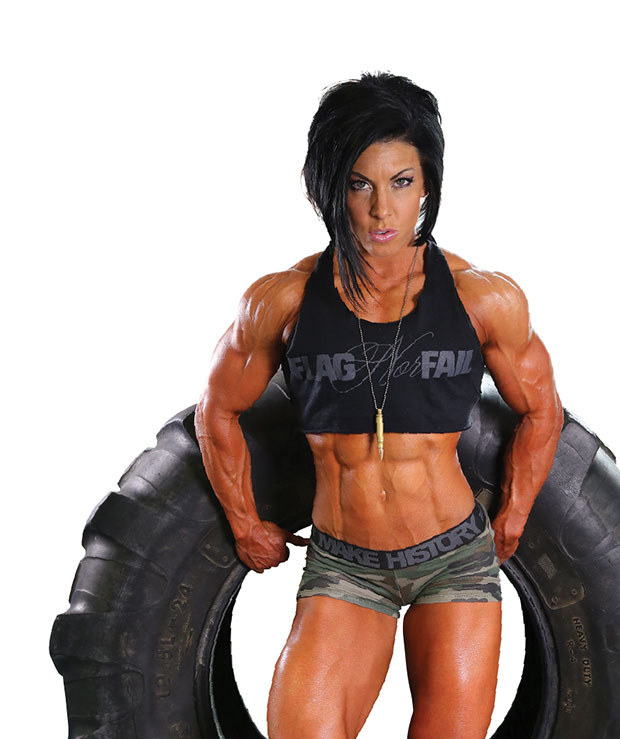
** What are some of your best strength lifts?
235 lb for bench
315 lb for squat
315 lb for deadlift
7) You’re exceptionally active, a true athlete beyond just physique competitions. Going forward, you’ve mentioned getting into powerlifting and potentially doing marathons—not exactly the norm for IFBB physique pros. What inspired this change in training protocol?
I’m an athlete, so I always want to test myself. I’ve already tested myself through bodybuilding; it’s not like I’m done bodybuilding. But I don’t think I’m using my full athletic potential. People don’t realize that for the Olympia, I was running six to eight miles a day if I wasn’t doing the Stairmaster. Most bodybuilders can’t really do that. If you got me in a pool, I could get back in swimming shape. So I think I can try a triathlon one day! Or even a Tough Mudder. Obviously I want to do a powerlifting meet because we know so many strong men in the industry who can help teach me how to powerlift properly. I want to start doing different things.
I’ve already conquered my bodybuilding goal! What’s better than winning an Olympia? No offense to Phil Heath, but what’s next? You’ve already won four, so you’ll do five. I want to do something else. I’m not knocking him. But I’ve already done that. So I might come back for this year’s O, and it would be amazing to win another, but I want to do something else on top of that. I want to do everything.
8) Straight and to the point. Why are you so popular? 1.4 million likes on Facebook, 69.3K on Twitter, and 720K on Instagram. Similar to Arnold in his heyday, you’re also a crowd favorite at every show. Why do people love and gravitate towards you?
I have no idea! I really don’t. I wonder that. I don’t know how I got to this. I think the biggest reason is that we are who we are. We never tried to play a part. We’re brutally honest. When branding myself, we branded with complete honesty and kept my morals. A lot of people respect me for things that don’t normally happen in the fitness industry. Like, breast augmentation for example. I get a lot of respect from women who respect me because I’m real. There’s nothing fake to me. There’s almost like a comfortableness with me. Guys like me too. My fan base isn’t just people who want a sexy fitness girl. And that’s why guys follow them. But the guys that follow me are different. I have a lot of fans who are couples; guys are okay with showing me to their significant others because I’m not lifting in a thong or booty shorts. I’m not going to play the sex kitten. So the guys feel comfortable showing their girls my picture, and the girls don’t feel intimidated because I don’t have obnoxious boobs and no clothing.
A lot of the stuff now online is porn. Fitness model was just over the top, half-naked, not tasteful. That’s not who I am, so I never portrayed that, and I think people see that.
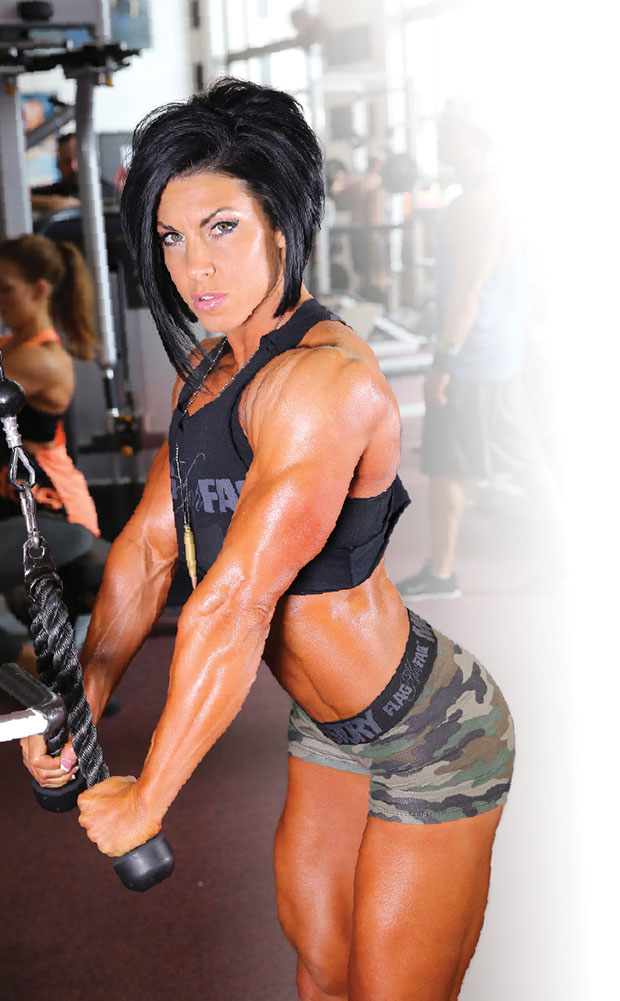
9) A couple of days after the Arnold, you posted a video where we’ve seen you as we’ve never seen you before, run-down and exhausted. Why expose that side of yourself to your fans, in a world where celebrities are always trying to put their best foot forward?
That goes with that last question about being completely real. We want to show people that I’m human. I’m not this superhuman that can go, go, go every single day. There are some days where I don’t want to be in the gym, and there is a struggle. So we made sure to do before the Olympia to do that video series 10 days out on leg day, where I was crying. You’re never supposed to show that. You’re supposed to show how confident and ready you are. But we didn’t. we show exactly what’s on my mind—if I’m second-guessing myself or not feeling right. There are days where it goes off and on. Some days I feel great, but the very next day I feel like I look horrible. Bodybuilding is an emotional roller coaster, and you have to be ready for it, so we wanted to show all sides.
After the show is where I get the biggest mental drama with myself, and no one really talks about that: the post-show depression. Because you look a certain way onstage, and in two days, it’s gone. Something that you worked 16 weeks for is destroyed in two days just from eating some regular foods for a day. That plays a huge part psychologically in your head, and you really need to talk about that. Showing that was a really big deal. Even though I’m a pro, I have days where I feel horrible. We’re just trying to be as real as possible. And people like me because people can relate to me.
10) Let’s talk about the “business of being DLB” for a bit: What made you and Rob decide to start doing the Warhouse camps?
It was definitely a huge thing to start. We wanted a gym. I’ve always wanted my own gym. Like everything we’ve ever dreamed of, we worked towards. So my dream was to have my own gym. So we started purchasing equipment, and we decided to call it the Warhouse. It wasn’t open to the public. It was just for us and our employees. But one day we decided to open camps so people can talk to us and learn from us. So we started doing the Warhouse camps, and they became a huge success. It was just a way for people to come see us, meet us, and see what we’re all about. We want to tell our story of how we got to where we did.

12) You and Rob have the Flag Nor Fail clothing line, Rob’s music career, the Warhouse gym camps, the Speed Warhouse and your recent launch of Onward. How do you manage it all? What drives you to succeed and tackle so many challenges, both inside the gym and out?
We’re very ambitious. We want to be involved in everything, so now we have everything under one roof. We have our gym, we have the clothing, which is in that building, the Speed Warhouse because we love carbs, we have our own fabrication, and we have a music studio too. It’s pretty much everything we wanted. The sky is the limit for us.
I don’t know where the motivation comes from. We’re very self-motivated. We always want to have everything we want. We have such a great time, and that’s what keeps us moving. We also really focus on our employees. The harder we work, the better their lives can be. So we’re trying to get bigger so we can have a better life, and so can our employees. Without them working their asses off, especially when we’re traveling, we wouldn’t have everything we do. They’re amazing.
11) What made you guys come up with Onward, your new supplement?
Onward started because we never wanted a supplement line. We’ll not release a protein ever. The supplement industry is already saturated. I use a ton of different proteins and pre-workouts. So we don’t want to take away from something that’s already created. We made Onward because there was something that was missing. We needed something to keep us healthy and alert and focused. We were just mixing random stuff together. Because every weekend at expos, we just got run down. We created something that wasn’t already on the market.
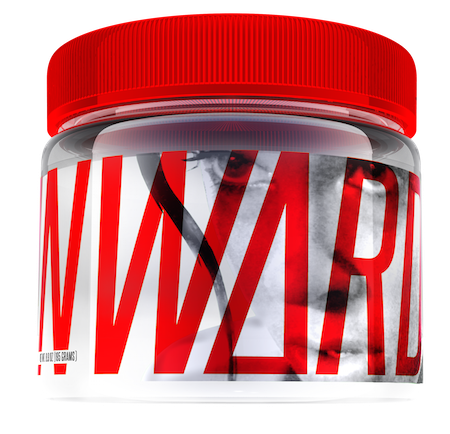
13) How do you find balance in life, relationships, and training?
I balance things with a lot of help. A lot of people might not know that Rob and I lived in the warehouse for two years. Every waking minute was Flag Nor Fail; there were employees there 24/7. We didn’t leave the warehouse. It was great, and it was what we needed to do at the time, and that’s what got us where we’re at now. We were just focused for two years straight to get it to the point where it’s at now. We have an amazing staff helping us now that keep everything organized when we’re away. We bought a house, which helps us clear our heads a little bit. We were missing that whole relationship thing because people always surrounded us when we went to bed. There was nothing, just work, for two years. So now we have a house, and have our own separate time, and that takes a lot of stress off. The warehouse was great, but a lot of stress on our relationship. Things are still a little off balance now, but that’s okay, because if we’re working this hard now, the future will be a lot easier.
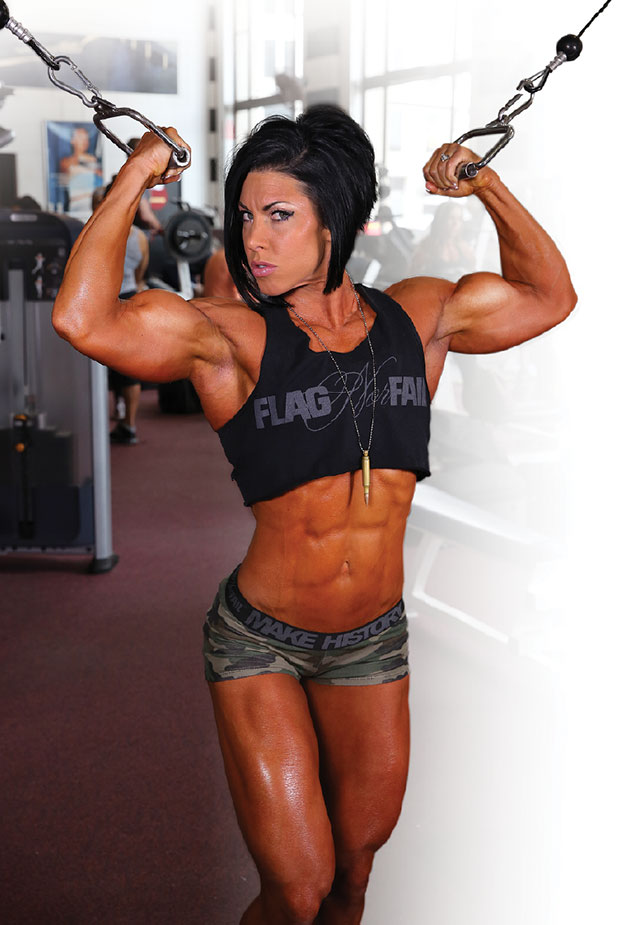
14) Moving away from the present for a minute, let’s talk about future plans—what’s next for DLB? What kind of impact do you want to leave on the sport?
I don’t even know! My goal in why I do what I do is just to show women that they can be strong and feminine, and pretty, and still have muscle. They can be whatever they want to be. That goes on the same level as your life. Rob has shown that if you work hard enough, and you have a dream, you can do it! We are the living proof of the American dream. We started dead broke, and after starting Flag nor Fail full-steam ahead, we eventually got there. I think that goes for anyone’s goal, if you work hard enough, you can do whatever you want. You need to learn that you might not sleep or eat, but anything is possible. I don’t know what my legacy will be, but I know there will be one.
We aren’t planning anything else with Onward other than coming up with new flavors. That took so many months, so we’re not really focusing on anything else. Our next goal is to franchise the Warhouse gym. Maybe we will do a separate Onward with less stimulants, but for now, the next venture is to fix the gym culture. The gym culture is dead. It’s basically fixing the culture that goes to the gym. Crossfit, for example, has it nailed down. It’s all about the community. Their culture is amazing; you have people who are paying five times the amount that doesn’t even have a ton of equipment. But it’s a group of people who are all there for the same reason, and they’re all cheering for each other. But then you go to a bodybuilding gym, and there are different cliques, and people aren’t talking, or if people are doing something wrong, you’ll end up on a website where people make fun of you. Hardcore gyms are going out of business because people are going to more friendly places. And even formerly hardcore places like World Gym are taking away weights and bringing in more cardio because they don’t want you to lift, because they’re trying to compete with Planet Fitness. We don’t want gyms or compete to compete against each other; they should just compete with each other to better themselves.
I don’t know how we’re going to do it, but we’re going to do it.

